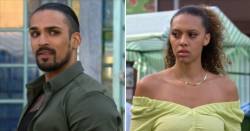
Forgive me if I’m a little apprehensive about deaf model and dancer Tasha Ghouri being the first cochlear implant user on Love Island.
In addition to not being the biggest fan of the annual tonsil tennis tournament, the ITV2 dating show doesn’t exactly have the best track record when it comes to disability.
Look no further than producers proudly proclaiming Hugo Hammond – who was born with clubfoot – was their first disabled contestant, seemingly forgetting that autistic Islander Niall Aslam entered the villa a few series prior.
Now, they’ve cast deaf 23-year-old Tasha, even though Love Island still comes without live subtitles on the ITV Hub.
Then, there’s the small matter of Tasha viewing deafness as a ‘superpower’ which ‘doesn’t define her’. She is, of course, entitled to that view of her own deafness, but it’s certainly not one held by the majority of deaf people like me.
I’m moderate-to-severely Deaf, and wear hearing aids in both ears. I can safely say that my community doesn’t pity or despair over our lack of hearing – nor do we hold deafness up on a pedestal. We accept it as being an integral part of our identity, and we’re proud of that fact.
Yet, frustratingly, the comments from other Islanders in response to Tasha telling them she’s deaf were all painfully reminiscent of past conversations.
‘I would not have had a clue,’ admits Luca in his beach hut interview after Tasha’s announcement. It’s the kind of well-meaning but wince-inducing remark I receive every so often, but the fact is I simply want my deafness to be acknowledged and accepted, not erased or disregarded completely.
I don’t ‘suffer’ from deafness; I suffer when audism rears its ugly head
Granted, we’ve all heard of the term ‘invisible disability’ or ‘hidden disability’ in relation to deafness, but what that fails to recognise is that deafness is there, if you know where to look.
It’s in the gentle reminders to repeat yourself. It’s in the looks down on our phones because the noisy environment is too inaccessible for us.
To say you didn’t even notice we were deaf is to risk saying you wouldn’t notice when we’re facing accessibility barriers, and that’s what we really need hearing people to pay attention to.
If that wasn’t bad enough, fellow Islander Indiyah goes on to reveal: ‘I just honestly wanted to give her a big hug, because I just wanted her to know she’s not alone. We’re all here to support her no matter what she’s going through.’
While I am normally in favour of a good hug, deaf people don’t need your sympathy, nor do we want you painting our condition as some devastating or debilitating illness.
Yes, there are moments where being deaf can be challenging, but most of the time, that comes from prejudicial attitudes from hearing people or inaccessible environments.
Those are the things that make me frustrated, not my deafness itself.
To put it another way: I don’t ‘suffer’ from deafness; I suffer when audism – that is, discrimination against deaf people – rears its ugly head.
And in fairness, I can understand why Indiyah may have been inclined to remind Tasha that she is not alone as a deaf person.
To view this video please enable JavaScript, and consider upgrading to a webbrowser thatsupports HTML5video
When I was a self-conscious teenager and told by an NHS audiologist that I may benefit from hearing aids, I burst into tears.
It was a shock, and I didn’t have the confidence to talk openly about it.
I grew my hair to untameable lengths with the aim of covering up the plastic tubing protruding out of my ears. I was yet to truly understand that part of my identity, so I wanted it hidden.
All of this means that in the first instance, deafness can be an incredibly isolating experience. I make no attempt to conceal that fact.
If Tasha was still coming to terms with her deaf identity, then maybe things would be different, as I too hurried to find other deaf people who shared the same experience as me.
But the fact Tasha has accepted the part deafness plays in her whole identity – she says it ‘doesn’t define’ her – means she probably doesn’t need reminding that she’s not alone.
Even if she hasn’t made friends through the deaf community, prior representation on-screen like that of Rose Ayling-Ellis on Strictly and Nadeem Islam on The Bay will demonstrate that deaf people exist and with the right support, we can do anything.
Except, did you notice how, in the carefully cut scenes on that episode of Love Island, we didn’t see conversations around how the Islanders could support her. Should I write things down if Tasha didn’t hear me? Would gestures be useful?
If those conversations took place, then producers should be showing them.
Because not only would it go some way to rectifying the disastrous comments aired on Monday’s episode, but it would shift the conversation away from ‘how can we make Tasha happier or more comfortable with her deafness’, towards ‘how can I work towards accessible communication and breaking down barriers?’
It’s an interesting question to ask, not least because it requires a little introspection – something that isn’t always the most comfortable thing to do.
But the benefit of that conversational shift is that hearing people can go beyond the unhelpful behaviour of pitying or minimising our deafness, moving towards how they can be a better ally.
And that’s a far more constructive conversation to be having.
Do you have a story you’d like to share? Get in touch by emailing [email protected].
Share your views in the comments below.
Love Island 2022 latest
Kiss goodbye to your social life – Love Island is back to dominate your evenings, with the new series promising more drama than ever before.
- Full Love Island 2022 line-up
- Love Island launch episode review: Cringe-worthy moments but we’re not swiping left yet
- I went to the new Love Island villa and the reality is not what I expected
- Which Love Island couples are still together?
For all the latest updates, visit Metro.co.uk‘s Love Island page.
Source: Read Full Article


